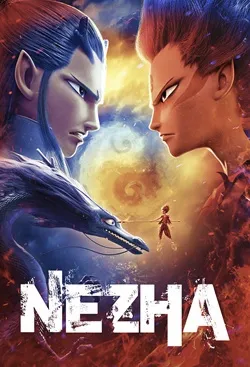
Ne Zha was a movie chosen by my fiancée, after she learned how popular Ne Zha 2 was. We decided we’d start here and check out the second one later.
I have to say, I am so deeply impressed by this movie, all the more so knowing that it was the first feature-length film produced by the director, Jiaozi, as well as the production company’s first film. The visuals are stunning, the story is compelling, and the mythology that it draws on feels new to me (in spite it being a millennia-old tradition). Chinese stories like this aren’t told well in Western media: they tend to be orientalized, exoticized, and/or syncretized. Ne Zha, on the other hand, provides something else. We’re expected to know what the Immortals are, how heaven/earth function in the traditional Chinese worldview, and more. The fact that there isn’t an hour of exposition explaining these things to us make it all the better.
The story itself is fairly simple: a long time ago there was a chaos orb. It was split into two: the Spirit Orb and the Demon Pill. The Demon Pill was cursed, so that whoever is incarnated with it would die after three years, while the Spirit Orb would live on.
Ne Zha was born to receive the Spirit Orb, but–due to some sneaky malice–he receives the Demon Pill instead. He wreaks havoc on the village, and is brought under control with a magical ring. His development, then, is to try to win acceptance by the village that reviles him, while also allowing him to be true to himself. For most of the narrative, he has no idea that he is a little demon boy, so he simply does not understand why villagers treat them as they do.
Ao Bing, on the other hand, is the recipient of the Spirit Orb, and his purpose is to bring the dragons back to earth. After all, they are imprisoned in their attempts to keep the most vile monsters under the surface. Whoever has the Spirit Orb will be given the opportunity to sit at court with the other Gods, and Ao Bing would have the potential to bring dragons back to earth.
Ao Bing, too, is given circumstances that are not of his choosing. He, like Ne Zha, just wants to be a kid and play. He doesn’t want to harm anyone, he just wants to do well and be accepted.
The story, in classic Taoist manner, unites yin and yang–spirit and demon–to create something greater than either of its parts. However, it also diverges from classical belief systems in its rejection of fate and valorization of free will: only we can choose who we want to be. Our destiny is not made for us (something that also appears very strongly in most superhero movies–most recently in Superman).
While the story itself was reasonably predictable, the world that Jiaozi provides is not. Instead, it is a captivating space that makes me want to learn more about the source material. It’s a must-see.